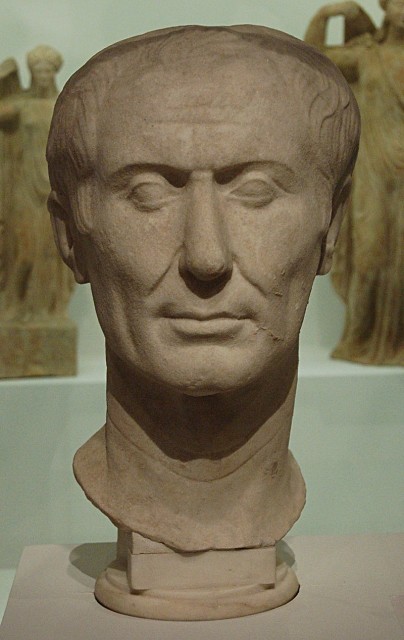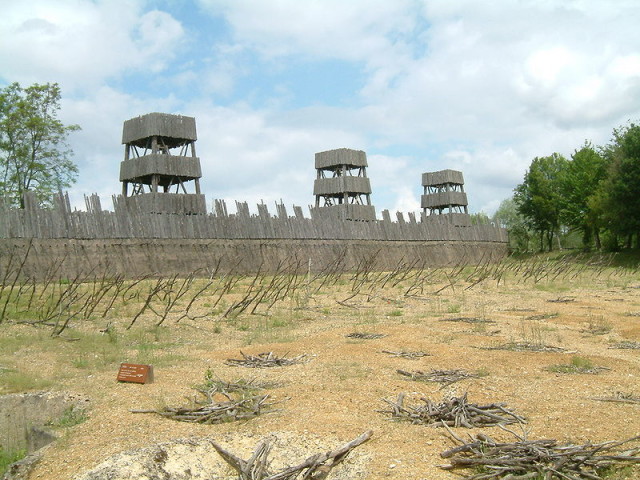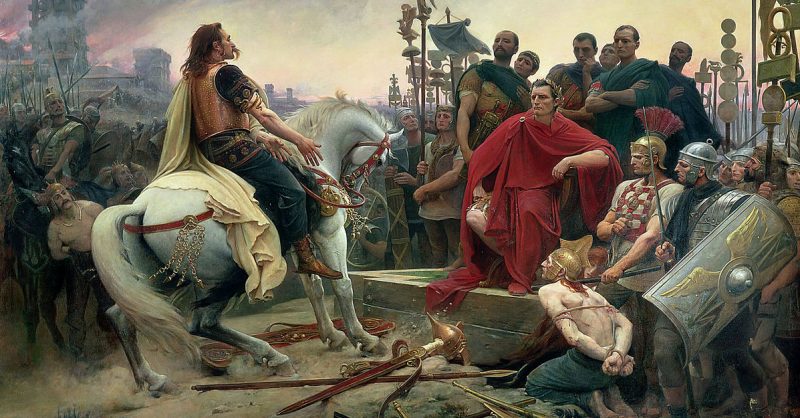The Imperator Gaius of the Julii, who was called Caesar, was in Gaul with sixty thousand men. Twelve legions of Roman infantry were supported by auxiliary infantry, Roman cavalry and Germanic cavalry. Together they made for a force in which he had full confidence. His trusted tribunes, Marcus Antonius and Gaius Trebonius, were in charge of the cavalry. His men were supplied with enough grain to keep them on their feet and working. It was mid-Autumn, and the leaves under the wide sky were turning to red and gold.
They had been on campaign for many years now, this tall man and his army. They left behind them many dead friends and more dead enemies. There was nobody in the host who had not seen battle. They were his to a man, and his confidence in them was returned tenfold. He was to them much more than the commander.
He was their Father; he was their brother-in-arms. The soldiers made obeisance to the Gods, but in reality, he was the only God that mattered. The tall man, black-eyed, sinuous and terrible, Gaius Julius Caesar, the greatest general the Roman Republic had ever known. The men loved him; they feared him, they trusted him. They were his, and he used them well.
In Rome, there was arrogance, pride, gluttony and unchecked wealth. The heart of Rome was rotten, and he brooded on it in his darker moments. Here, he thought, as he looked out from one of the towers, here was Rome. Men, bare to the waist, working fast and efficiently, digging, cutting stakes, raising walls. Others were guarding the workers, these men armoured, ready, still as statues, watching the besieged town for any threat of movement.
This was Rome. Order, loyalty, hard work for a fair commander. Here there was no gluttony, no arrogance, only a tight, well-ordered machine. There was pride, maybe, but only the justified pride of a skilled task well handled, of duty unhesitatingly carried through. This, thought Caesar, this was Rome.

It was early morning, and the outer ring was almost complete. The sorties from the town which had assailed the earlier stages of his great work had stopped entirely. On the plain away to the south-west the force which had come to the relief of the besieged town was slowly gathering; a great force of cavalry massing out of bow shot from his walls. Caesar was outnumbered, he knew. His enemy was fierce and skilled, and now they were made more dangerous by the knowledge that they must have the victory or be utterly destroyed. He was taking no chances.
This is how it was. On the hilltop was the walled fortress town which they called Alesia. Inside the town was the great Chief Vercingetorix, who had gathered to him a last alliance of the Gaulish tribes to throw off the yoke of Rome. His army was many tens of thousands strong, and Vercingetorix himself was a skilled tactician. Already Caesar had tasted defeat at his hand, and he would not do so again. The Gauls had retreated into the town and barred the gates, and Caesar would not risk a frontal assault. Instead, he would starve them.
The Roman army was set to building a great ring of ditches, walls and watchtowers, pits and mantraps filled with sharpened wooden stakes. When complete, this ring would be fully eighteen kilometres long, entirely encircling the town. One night, as the works were almost complete, a great body of Gaulish cavalry crept noiselessly to the only gap in the ring, where a ridge of rock prevented the circle from being fully joined. They gave battle, and the Romans slaughtered or captured many, but many more of the horsemen broke through and fled across the plain. Caesar guessed rightly that they had been sent to beg for reinforcements from the nearby settlements, so he immediately set his men to build a second ring of siege works to defend the first. Now, he watched the final touches being applied to this outer ring as the Gaulish reinforcements trickled in to fill the far plain. The besiegers had become besieged.
They settled in to wait. Weeks passed, the weather became colder, and the supplies within the Roman fortifications were strictly rationed. In the town on the hill, conditions were worse. One evening the gates were opened and a horrible wailing and crying was heard. The Gaulish warriors, in a desperate attempt to save food for the fighting men, were ejecting the old, the very young, and the women from the city. These people – who numbered in the thousands – came wailing and weeping toward the Roman defences. They begged to be taken in, they begged to be enslaved. Food, they begged for, food and water. Caesar gave orders that they were to be left where they were. He could spare no supplies for these wretched folk.
It chafed at him, though. They could have represented a valuable commodity to him; slaves were a reliable source of income for a conquering general. Also, he was not a monster. It gave him no satisfaction to see helpless civilians dying of hunger, cold and thirst outside the walls. Indeed, though he did not show it, it hurt him. The sounds of their suffering disturbed his brief hours of sleep and entered his dreams. He was quietly relieved when death and exhaustion began to silence their screaming.
They waited. The days were shortening. One bright, cold morning movement was spotted in the camp on the plain. The enemy host was on the move. They poured up the hill toward the outer wall with a great blast of their harsh war horns. From the town came an answering horn call, and the gates opened to release a tide of warriors on foot. On both the inner and outer rings they broke like the sea upon a rocky shore. They impaled themselves on stakes, caught themselves on the many iron hooks embedded in the ground.
They fell to Roman slings and Javelins as they attempted to fill the ditches and close with their enemy. They filled the ditches with earth, and with the bodies of their dead. When they reached the walls, attacking with grappling hooks and rough ladders, the Roman infantry knocked them back with the Gladius, the spear and the shield.

The Germanic cavalry levies showed their worth. Light and swift, each rider was accompanied by a light infantryman on foot, as was their custom. Again and again, if the tide seemed to threaten to overwhelm the defences, Caesar released his cavalry against the Gaulish flank. They would pour from small pickets in the wall until there was a great number of them out of site of the main attack.
Then they would rush round, the men on foot moving fully as fast as the mounted riders, crashing with a great noise into the flank of the pressed crowd. The assault from the walls would redouble, and the Gauls would be crushed between the wall, the ditches and the horses. They would panic, break, reform. The riders would reform and retreat, faster than their enemies could pursue. Again and again, against both the inside and outside wall this play was repeated. The sun climbed high into the sky, the afternoon turned into evening. The assault waned. Great numbers of the dead and the wounded were heaped and scattered around Caesar’s walls, yet the walls had held.
His men were tired, but they were grim, determined, and pleased. They had done well for their General, and there were many more Gauls dead on the field than there were Romans. Wounds were bound, small rations of food and drink were taken. Men slept and fought and slept in shifts. As night fell Caesar ordered torches kindled along the wall and in the hands of the watchmen. There was no moon and little starlight. The torches cast small pools of light, but beyond them, it was very dark. For several hours, all was quiet.
It was near midnight when the assault began again. This time, they were in earnest. The Gauls could ill afford another indecisive engagement. With ladders, grapples and wattles they stormed the ditches and sent a hail of darts, javelins, stones and slingshots against the walls. Again, warriors poured from the town, only to be hindered by the many traps laid out before the walls. All night long the fight raged and swirled around the outer wall. At times, the Roman defence faltered, but the Gauls, despite their great number, could not break through. At dawn, they retreated once more. Twice, the walls had defeated them.
At noon the next day they took their final stand. On the north-west of the outer wall, two legions defended the weakest point of the Roman defences, where they had been forced to build their line across the bottom of a slight hill. On top of this hill the main host of the Gaulish infantry gathered for their last great attempt.
The Romans were hard pressed. From a high point on the walls, Caesar watched the development of the battle. His men were spread thinly along the long line of the wall, and though the Gauls pressed them at all points, ever the assault fell heaviest at the weak northern section. The men from the town made a great press against the inside of the defences, from the outside earth and missiles were hurled against the walls. The ditches were filled, the Gauls were inside the perimeter! The walls were being torn down, and the Romans driven back step by step.
Caesar himself took a hand at last. Sending the last of his reserves to the gap he took two cohorts and all the remaining cavalry and rode out from the walls. He tore round the line of the defences, overwhelming any who stood in his path. From the walls the Roman soldiers, seeing his scarlet cloak flying in the wind of his speed, sent up a great cry. All that was left of the great Gaulish force was pressed into the breach in the Roman walls. For a moment it had seemed to them that their victory was at hand, but their joy was replaced with terror as Caesar rounded the line with his cavalry squadrons.
The breach became a death trap. The Romans, seeing the coming of their great general, redoubled their efforts. The Gauls attempted to break back away from the walls, but the cavalry thundered into them, and Caesar was like Mars himself, a God of war made flesh, as he pressed his fleeing foe before him. The slaughter lasted all day and into the night, and the next day the starving town was surrendered to Caesar. Vercingetorix himself threw down his weapons at the feet of his enemy and was made prisoner.
Caesar’s great victory had come close to disaster, but the Siege of Alesia was to be the decisive engagement of the Gaulish campaign. Never again was such an alliance to be raised against the might of Rome. All Gaul was conquered.
